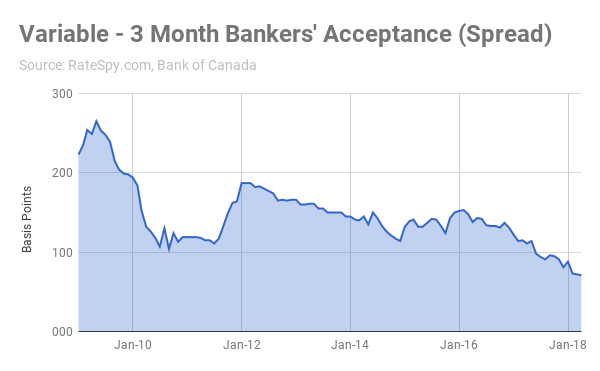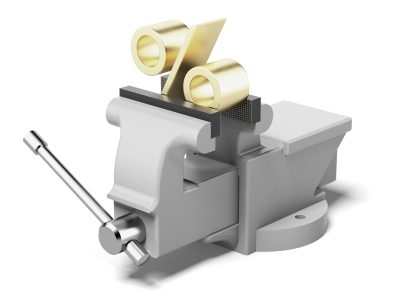Prime – 1.00% is a primo mortgage rate. No question about it.
Yet, there are people complaining that it’s not the “prime minus one” of old.
Prior to January 2015, critics point out, prime rate was 200 basis points (bps) above the Bank of Canada’s key lending rate. Now, banks have pushed this margin to 220 bps. The fatter this spread goes, the more banks make (other things equal).
So far, all of this is true, of course. Back in 2015 Canada’s opportunistic banks pocketed 40% of the BoC’s rate cuts. That, say critics, results in banks making more on variable rates today — on the backs of Canadian consumers.
Spreads Tell a Truer Tale
If only we knew the difference between the average variable rate and the big banks’ cost of funds. Then we’d be able to tell if borrowers are being gouged or not.
Well, lo and behold, we do.
And they’re not.
Observe the “Variable-BA Spread,” which refers to the difference between:
A) the average variable mortgage rate
and
B) the 3-month bankers’ acceptance (BA) yield.
(Three-month BAs are a rough proxy for the big banks’ basic variable-rate funding costs.)
Using today’s rates as an example, the 3-month BA is currently 1.69%. If a big bank offers you prime – 1.00% (i.e., 2.45%), it’s making roughly 0.76 percentage points (76 bps) of spread on your mortgage.
That, of course, is before the bank pays its staff, covers overhead and incurs a range of other costs.
Spreads Are Narrowing
The chart below counters the popular diatribe that banks are gargantuan money-grubbing profiteers that pass along savings, like, never.

The reality is, banks have steadily earned less and less on variable-rate mortgages for six years running. In fact, they’re earning less on deep-discounted variables today than they have for over a decade (as far back as our data goes).
The key words are “deep discounted.” Banks don’t offer their best rates to everyone. In this context, “deep discounted” refers to insured and uninsured discretionary rates offered to well-qualified borrowers and variable rates sold by non-bank lenders using bank funding.
The Forces Are Aligning
Note the steeper drop in spread revenue over the past year or so. In that time-span, bank competition has shifted to a higher gear.
We’re seeing:
- Online-savvy competitors (e.g., HSBC, Meridian Credit Union, etc.) give it to the banks
- Mortgage brokers increasingly buy down rates
- Rising rates, high home prices and regulatory restrictions pushing mortgage growth to 17-year lows
- Rates are rising (which gives banks more spread to work with), and
- More people using rate comparison websites.
The mortgage consumer is growing smarter every year. Thanks to Google-power, people can now log into sites like this and tell in seconds if their bank is hosing them on their rate.
That isn’t banner news for banks who must eat into net interest margins to keep pace of competitors. But it’s sure as heck great news for Joe Consumer. And all that good news is translating into record savings on big bank variable rates.

 log in
log in
 Prime – 1.00% is a primo mortgage rate. No question about it.
Prime – 1.00% is a primo mortgage rate. No question about it.
8 Comments
Nice work. I wonder why 1 month Bankers’ acceptances isn’t a better proxy for variable rate funding costs.
Hey Ralph, Banks fund a portion of their 5-year floating-rate book with longer-dated funding. It’s not just 30-day funds.
Thanks for the article. What mortgage term and type is best to take right now given the ever changing mortgage environment?
Hi Clinton, It’s tough to make a term recommendation without some basic info on the borrower. If you want to provide the following information one of the brokers on this board should respond with ideas: https://www.ratespy.com/term-selection-checklist
Here’s my question to the B&B:
5 yr variable closed: 2.45
5 yr fixed closed: 3.64
4 yr fixed closed: 3.49
2 yr fixed closed: 3.24
All from RBC
206K w/14 years left on the clock. Just coming off of a two yr fixed @ 2.19 and willing to go back to Variable but pay weekly at the 5yr fixed rate to avoid rising rates. Does that sound like a strategy? Am I missing anything?
Thanks for all you guys do!
Hi Stew, Relative to those other options, the prime – 1.00% variable paid like a 5-year fixed is a sound move if you’re well suited to a variable. That said, shop around if you’re open to switching lenders. You may find a better product (features-wise) and at least $1,000+ in savings over five years.
My situation is similar to stewH. My mortgage renewal is coming up. Currently @2..09 two yr fixed. Prime -1 looks very tempting however very confused given rate hike trends/indications. What is “if you are well suited to a variable” means in your response?
Hi Nick,
It means you can afford 2%+ higher rates, have a psychological tolerance for the risk of such hikes (given the potential reward) and/or prefer a lower penalty.
Here’s more –> https://www.ratespy.com/fixed-or-variable-rate-the-decision-checklist-02223752